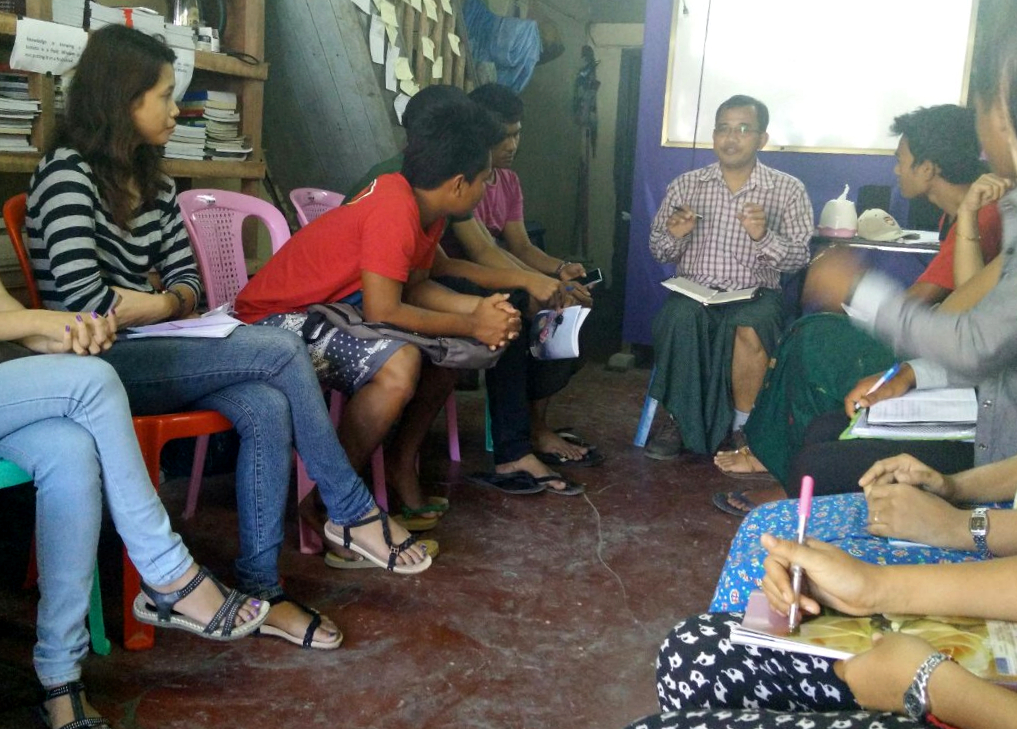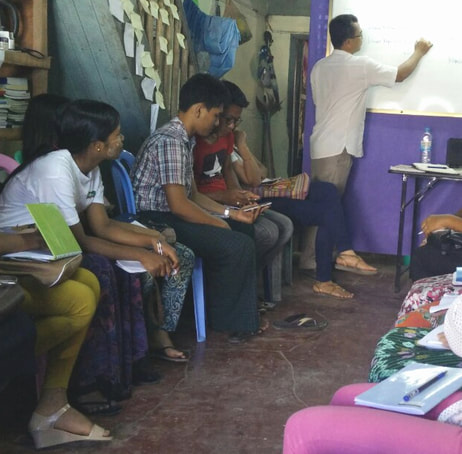|
At CEAL (Center for Education, Art and Literature), the students and I met a Cambodian man who is the Peace Partnerships Program Officer for the Amercian Friends Service Committee. The AFSC is based in Philadelphia and is part of the Quaker organization. They arrived in Cambodia after the Khmer Rouge Killing Fields of 1979 and are now expanding into other Asian countries with an office based in Yangon. I attended both sessions run by the Peace Officer and used the opportunity to observe classroom behavior in the students. The first class was from 12 noon - 3 pm with 16 Arakanese youth, the Peace Officer and me. A few more stragglers entered over the course of about half an hour, bulking the group to around 20. The aim of the class was to find out what problems are facing the youth of Rakhine, and how the AFSC can provide help, especially in the areas of justice, discrimination and conflict resolution.
The students were shy and reluctant at first to express their opinions; the questions that the Peace Officer asked were a little vague which I don’t think helped with the language barrier and the fact that Myanmar schools don’t encourage critical thinking. I think that it is quite scary to participate and speak out in front of everyone, even though they are friends. Also because the Arakanese students don’t get much exposure to English from sources other than Myanmar natives, I think that the accent proved to be a real barrier to communication. Indeed, my students here have admitted that they didn’t really understand me when we first met and they had to concentrate hard on my words and phrases. From what the students did share though, I got a lot of useful information. There aren’t any classes for intermediate or advanced level English in Sittwe. A lot of students want to study for IELTS (International English Language Testing System), which is the Cambridge test of English language skill, but are unable to do so alone and find that they don’t do well because they don’t understand the format or skills that the exam is designed to test. In order to apply for international scholarship programs, a score from IELTS or the American TOEFL (Test Of English as a Foreign Language) is usually necessary as these are the two industry standard tests which give a reflection when compared to students from other countries. Additionally, it appears schools don’t teach transferable skills which are necessary in the job market. The students expressed dissatisfaction in the ‘4 skills’ English classes generally offered in the area, as well as the computer classes. I need to enquire further about this because I would assume that computer classes would contain transferable, useful skills. There was concern expressed about how easy it is for children to get cigarettes and betel nut at school and there was talk about how the exams are unfair and the problem of the government curriculum favoring the Burmese race above all other ethnicities. This makes it hard to relate to the children as well as increases the tensions between the ruling ethnicity and the large minorities. In the university, many of the teachers are temporary and often don’t know the syllabus. They often change in the run up to the exam period, leaving new teachers who don’t know what’s been covered or how best to teach the students who are new to them. More generally, it appears lack of jobs and money is a huge problem. Many young people can’t find work and even if they want to set up community engagement projects they find that they don’t have the capital or the cash to make it work long term. Currently at CEAL, the leader expressed that he wants to instruct the students in Powerpoint, but the projector is broken so he is unable to do so. He also mentioned that simple things like paper, electricity and other such things that many people take as given in so many places around the world. From the officer, we also learned that Cambodian primary schools have the highest ratio of children to teacher outside of Africa, averaging 46 - 1. The total GDP has been somewhere around 3% over the past few years, but in 2015 the budget was raised 20% to $440 million. The students were interested in how education has been improved. From my observation, Myanmar people are searching for an attainable education model that can be successfully implemented in their own country. Chloe Smith NEH Coordinator and Teacher Trainer
Comments
|
This section will not be visible in live published website. Below are your current settings: Current Number Of Columns are = 3 Expand Posts Area = 1 Gap/Space Between Posts = 20px Blog Post Style = card Use of custom card colors instead of default colors = Blog Post Card Background Color = current color Blog Post Card Shadow Color = current color Blog Post Card Border Color = current color Publish the website and visit your blog page to see the results |
|
© New Education Highway 2024
Except where otherwise noted, content on this site is licensed under a Creative Commons Attribution 4.0 International License. |



